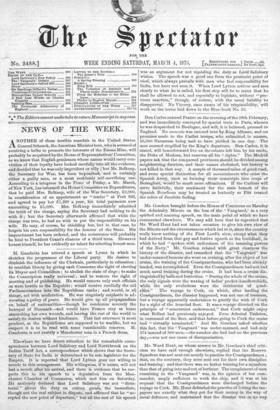Mr. Goschen brought before the House of Commons on Monday
the Admiralty Minute on the loss of the Vanguard,' in a very spirited and amusing speech, on the main point of which we have commented elsewhere. We may add here that he regretted that Mr. Ward Hunt had not taken occasion to give his own view of the Minute and the circumstances which led to it, since the country really knew nothing of the First Lord's view, except what they had derived from that gay and festive speech at the. Guildhall, in which he had " spoken with enthusiasm of the ramming powers of the Navy." Mr. Goschen related with great clearness the history of the disaster, and remarked that the 'Vanguard ' was under-manned because she went on cruising, after the object of her cruise, the training of the Coastguardsmen, who had been already landed, was accomplished. Even the Coastguardsmen had not had much naval training during the cruise. It had been a cruise dis- tinguished by balls and festivities. " During the whole of the cruise, the only signals were the waving of ladies' pocket-handkerchiefs, while the only evolutions were the intricacies of quad- rilles." The voyage to Cork, on which, after landing the Coastguardsmen, the disaster happened, was not one of business, but a voyage apparently undertaken to gratify the wish of Cork for a sight of the ironclad fleet. It was a voyage directed on the principle of "concurrent endowment," that Cork might enjoy what Belfast had previously enjoyed. Even Admiral Tarleton, in command of the fleet, said that before going to Cork the cruise had "virtually terminated." And Mr. Goschen asked whether this fact, that the Vanguard' was under-manned, and had only 374 instead of 500 men,—the number she had had on the previous day,—was not one cause of disorganisation.


































